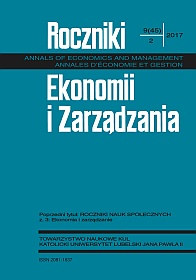An Analysis of the Relations between Virtuality and Intraorganizational Trust
Abstract
Virtuality of an organization is a factor that enables to increase its competiveness. Virtuality is related to time and space dispersion, electronic communication, instable and changeable structure, partnership and usage of IT technology to manage a company. Trust is an important element enhancing functioning of virtual organization. One can observe that in a virtual organization there is increased demand for trust, however at the same time there are more components presents stimulating its decline. Trust fosters achieving competitive advantage and effective functioning of an enterprise. This paper analyses research results conducted on the links between virtuality and intraorganizational trust in order to verify the hypothesis stating that level of virtuality impacts trust. The quantitative research based on the questionnaire. The received data from a research sample of 61 IT organization allows to investigate this relation. The results enable to analyze it based on statistical methods and verify the main hypothesis. The papers ends with conclusion.
References
Baldo F., Rabelo R.J., Vallejos R.V.: A framework for selecting performance indicators for virtual organization partners’ search and selection, „International Journal of Production Research” 47(2009), nr 17, s. 4737-4755.
Bauer R., Koeszegi S.T.: Measuring the degree of virtualization, „eJov” 5(2003), nr 2, s. 26-46.
Bultje R., van Wijk J.: Taxonomy of Virtual Organisations, based on definitions, characteristics and typology, „VoNet: The Newsletter” 1998, nr 2(3), s. 7-20.
Coates J.F.: Managing scientists in the virtual corporation, „Research-Technology Management” 37(1994), nr 6.
Communication World, More than a social virtue: Public trust among organizations’ most valuable assets. Communication World, 2003, nr 20, s. 10-11.
Francuz P., Mackiewicz R.: Liczby nie wiedzą skąd pochodzą. Przewodnik po metodologii i statystyce nie tylko dla psychologów, Lublin: Wydawnictwo KUL 2005.
Gambetta D.: Can we trust?, w: Trust: Making and breaking cooperative relations, red. D. Gambetta, New York: Basil Blackwell 1988, s. 213-217.
Giddens A., Socjologia, Warszawa: PWN 2004, s. 495.
Grudzewski W., Hejduk I.: Przedsiębiorstwo wirtualne, Warszawa: Difin 2002.
Jurga A., Trzcieliński S.: Information technology in virtual enterprise, Madison: IEA Press 2007.
Kanter R.M.: Evolve! Succeding In the Digital Culture of Tomorrow, Boston: Harvard Business School Press 2001.
Lo C., Chang Y., Chung K.: A Multiple-Agent Joint Procurement Process Model for Virtual Organizations: A Simulation Study, „International Journal of Management” 29(2012), nr 1, cz. 2.
Masłyk-Musiał E., Rakowska A., Krajewska-Bińczyk E.: Zarządzanie dla inżynierów, Warszawa: PWE 2012.
McKnight D., Choudhury V., Kacmar C.: Developing and Validating Trust Measures for e-Commerce, „Information Systems Research” 13(2002), nr 3, s. 334-359.
Najda-Janoszko M.: Organizacja wirtualna. Teoria i praktyka, Warszawa: Difin 2010.
O'Brien R.C.: Trust: Releasing the energy to succeed, Chichester: Jossey-Bass, Wiley 2001.
Perkowski R.: Life Cycle and the Efficency of Virtual Enterprises Based on Research, „Journal of Economics and Organization of Enterprise” 4(2009), nr 2, s. 52-64.
Ribiere V., Tuggle F.D.: The role of organizational trust in knowledge management: Tool & technology use & success, „International Journal of Knowledge Management” 2005, nr 1(1), s. 67-85.
Sankowska A.: Organizacja wirtualna. Koncepcja i jej wpływ na innowacyjność, Warszawa: Wydawnictwa Akademickie i Profesjonalne 2009.
Shermata W.A.: Centrifugal and centripetal for ces In radical new product development under time pressure, „Academy of Management Review” 2000, nr 25(2), s. 389-408.
Sieber P.: Organizational Virtualness. The Case of Small IT Companies, w: Organizational Virtualness, red. P. Sieber, J. Kriese, Bern: Simowa Verlag 1998, s. 107-117.
Squicciarini A.C., Paci F., Bertino E.: Trust establishment in the formation of Virtual Organizations, „Computer Standards & Interfaces” 2010, nr 33(1), s. 13-23.
Stranes B., Truhon S., McCarthy V.: Organizational Trust: Employee-Employer Relationships, „A Primer on Organizational Trust” 2015 [online] Available at: https:// asq.org/hdl/ 2010/06/a-primer-on-organizational-trust.pdf [dostęp: 10.09.2016].
Sztompka P.: Zaufanie. Fundament społeczeństwa, Kraków: Znak 2007.
Travica B.: Virtual Organization and electronic commerce, „The DATA BASE for Advances in Information Systems” 36(2005), nr 3, s. 45-68.
Tyler T., Kramer R.: Whither trust?, w: Trust in organizations, red. R. Kramer, T. Tyler, Thousand Oaks, CA: Sage Publications 1996, s. 1-16.
Uslaner E.: Zaufanie strategiczne i zaufanie normatywne, w: Socjologia codzienności, red. P. Sztompka, M. Boguni-Borowska, Kraków: Znak 2008, s. 184-187.
Venkatraman N., Henderson C.: The architecture of virtual organizing: leveraging three independent vectors. Discussion Paper, „Systems Research Center. Boston University, School of Management” 1996, s. 4.
Copyright (c) 2017 Roczniki Ekonomii i Zarządzania

This work is licensed under a Creative Commons Attribution-NonCommercial-NoDerivatives 4.0 International License.


